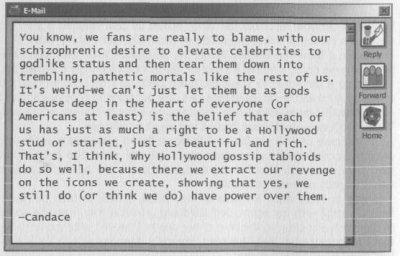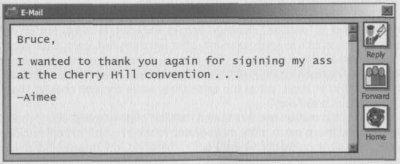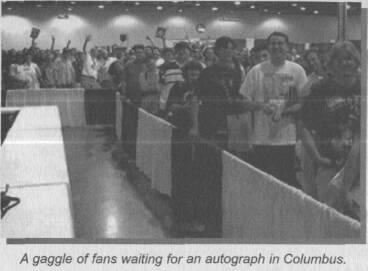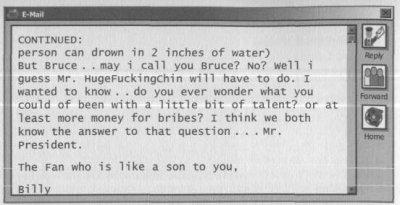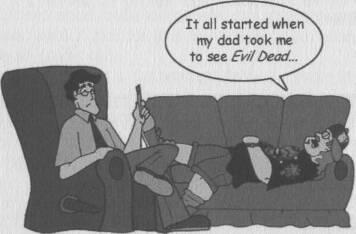If Chins Could Kill: Confessions of a B Movie Actor (45 page)
Read If Chins Could Kill: Confessions of a B Movie Actor Online
Authors: Bruce Campbell
Tags: #Autobiography, #United States, #General, #Biography & Autobiography, #Biography, #Entertainment & Performing Arts - General, #Entertainment & Performing Arts, #Actors, #Performing Arts, #Entertainment & Performing Arts - Actors & Actresses, #1958-, #History & Criticism, #Film & Video, #Bruce, #Motion picture actors and actr, #Film & Video - History & Criticism, #Campbell, #Motion picture actors and actresses - United States, #Film & Video - General, #Motion picture actors and actresses

But Princess Diana was different -- her death gave me the willies because of the way she died. Maybe it's because, as an actor, I've had cameras jammed in my face by dozens of photographers yelling "Bruce! Bruce over here... hey, Bruce!" I've walked the gauntlet at various functions, and even in these controlled environments, it was unnerving -- desperation seemed to permeate the air.
After Diana's death, "experts" debated the topic, in every form of media, and we tried to make sense of it all. Many folks blamed the photographers for her death. I'm sure they contributed in their own annoying way, but in the end they were merely errand boys attempting to satisfy demands placed on them by unimaginably callous employers.
Why would their editors encourage such behavior? The simplistic answer, they're quick to present again and again, is: "We are merely supplying the demand for stories like this."
Okay, so are these evil men and women, scheming in dark tabloid offices about how to cater to the lowest common denominator? Perhaps -- but not so obviously, I suspect -- they are simply doing nothing to rise above the "bad news is good news" syndrome.
We are a culture fascinated by the rise, and even more so with the decline, of famous people. Di's royal wedding was a big deal, sure, but the divorce was even better, and the only thing that could possibly top that was a horrible death -- now
that's
news!
I got an e-mail from a fan recently that cuts to the core of the issue:
As a seventeen-year-old kid, fresh out of high school, I had my first brush with celebrity as a theater apprentice. There, I met a number of "famous" people and worked among them for three months.
Meeting actors in person whom I idolized as a kid was both a thrilling and horrifying experience. More than anything, I was shocked to see that celebrities aged just like normal people. Doug McClure wasn't the strapping man I remembered from his 1960s TV show,
The Virginian
-- never mind the fact that the show was fourteen years earlier -- and Abe Vigoda didn't look anything like his character on
Barney Miller.
Apart from the disappointment, I was ultimately glad that they were human. The actors I met that summer were talented, for the most part, but they also got irritable, forgot their lines, and occasionally farted -- all the normal stuff.
Turnabout is fair play,
as the old saying goes, and I got to experience this recently at a public appearance. As a fan got close to shake my hand, she got a funny look on her face.
"Geez, you look like someone's dad," she said.
"Well, that's because I
am someone's dad..."
Evil Dead
put me at the receiving end of fandom. Six months after its release, a Ferndale, Michigan, cashier squinted at me.
"You look a hell of a lot like Bruce Campbell's brother," he said.
"Yeah, that would make a hell of a lot of sense," I replied.
Not long after that, I got my first fan letter. I can't recall what it said, or how they even found me, but I was thrilled nonetheless, and responded with a handwritten note, thanking them for their patronage. As the years passed, and I became more identifiable as a genre actor, a steady trickle of letters found their way to me, but
The Adventures of Brisco County, Jr.
opened up the world of mass-market fan mail.
The increase in mail wasn't a result of some new acting ability, it was merely because there were more regular viewers. When I looked at the numbers it all made sense -- even a low-rated TV show like
Brisco
snagged more viewers in a single night than all of the
Evil Dead
films combined.
I have found that the best place to interact with fans is at conventions -- my first being a Fangoria Weekend of Horrors event in 1988. In a jammed Los Angeles hotel, I spent two days interacting with folks that assumed I was just like the characters I portrayed in films. This resulted in gifts of home-grown poetry that would make your hair curl, requests to sign pierced breasts, and offers to attend all-night
Evil Dead
drinking parties.
The same type of thing happened during the run of
Brisco.
Because I played a "cowboy," letters arrived with offers to buy or sell horses or to grand Marshal parades in rural Western towns.
The real fun began when the two types of fans converged at some of the larger
Brisco
events. A "kids fair" in Seattle drew more than kids, and it was amusing to scan the autograph line to see some ten-year-old kid in a cowboy outfit standing in front of a spiked, pierced, leather-clad "deadite." Television wins the war of saturation, hands down. A motion picture can be shown around the world, but unless it's a blockbuster, it'll be gone from theaters within a month or two. The TV viewer can watch their favorite program week after week, sometimes for a decade or more, and the resulting impact, I feel, is far more indelible.
One day, I got a high school graduation tassel in the mail. The young man who sent it explained, quite matter-of-factly, that the tassel was a gift for me because, were it not for the show
Brisco,
he would have killed himself and never graduated.
Another note, sent from a despondent fellow, explained that he was about to commit suicide in his crappy Hollywood apartment, but he happened to catch an episode of
Brisco.
The positive image of life portrayed by the show caused him to reconsider.
Things like this can drive an actor crazy. On the one hand, I'm extremely grateful that a "positive" message helped someone in need, but on the other hand, what's to keep some kid, after watching
Evil Dead,
from slicing up Grandma with a chainsaw? The answer, I suppose, is "nothing," and that's the frustrating part. Filmmakers and actors all wish to have an impact on the world at large, yet at the same time, we're the first ones to shout, "Hey folks, it's all
fake!
"
As the information age blossomed, my fan mail morphed into e-mail. I have found this a much more manageable forum in which to communicate with fans, since no matter where I am in the world, my "mailbox" is always with me.
In case you've ever wondered what fans say to actors, I'll share a few notes, just to demonstrate the variety of sentiments floating around in the great cyber void.
Note:
I have made no attempt to alter or aid spelling or punctuation.
This first example represents the sincere fans who send pleasant, upbeat letters -- about fifty percent of what I get falls into this category. At the opposite end of the spectrum, there are fans who need twenty-four-hour observation. This next communique is one that I could not stop reading, regardless of how much I wanted to throttle the smug bastard.
That e-mail is, of course, an extreme example and only represents about 1.7 percent of my total fan mail --
thank God.
E-mails that fall into remaining categories run the gamut from mildly amusing, to quirky, to utterly incomprehensible.
Regardless of the format, I can speak for most of the actors out there that we are genuinely grateful to anyone who takes the time, not only to faithfully follow our work, but to write something that is inherently designed to brighten our day.
